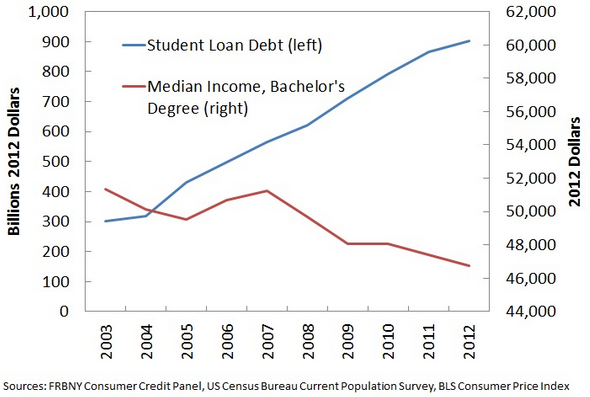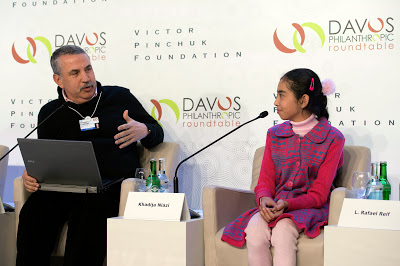This is the fourth post in my ongoing Series on Technology, Disruption (and chess). In my previous post we discussed what I called the Great Unbundling of Venture Capital and it led to a fascinating conversation on Twitter, in the comments, in personal conversations and on various blogs. People have strong feelings about venture capital and the topic of its evolution, and unbundling definitely touched a nerve with many.
In this post, we'll examine the phenomenon of an ancient and venerable institution, the university, which is in the initial phases of its own disruption.
The "too long, didn't read version" of this post:
- 4 of the 5 value propositions of the university *are* being and *will continue* to be disrupted/unbundled;
- we are in an immense bubble of 'education debt' that is unsustainable. Students will not, and cannot, afford to continue to burden themselves with crushing debt in the decades to come;
- universities have evolved over the centuries into siloed institutions where inter-school/inter-departmental cooperation neither comes naturally or easily;
- research and teaching (now coupled) will likely require unbundling over time;
- the unstoppable force of entrepreneurship, as it pertains to schools, faculty, students, alumni and the curriculum, will be one of the major "tips of the spear" or "bunker busters" in leading this transformation; and
- how universities acknowledge and adjust to the realities of #1 and #2 will determine their futures
-----
I've heard it said by many that the university has not changed its essential approach and structure for the last 1,000 years. Despite the evolutions of curriculum and despite many significant nuances and types of universities (about which entire books have been and will be written), I believe this to be in large part true. What I mean by this is that the iconic model- a professor standing before a room full of students and delivering her lecture as they scribble notes and ask questions- has been a constant for a millennium.
So, in keeping with our model of examining the phenomenon of unbundling and disruption in multiple industries, below is an 'unbundled list' of the various value propositions many Universities currently bring to the table. I'm using a slightly revised version of an excellent model that I believe was created by David Wiley:
VALUE PROPOSITIONS OF THE UNIVERSITY
1) teaching - content provisioning
2) research (exploration of knowledge and understanding for its own sake)
3) helping students w/ questions (ie, office hours, master classes, review sessions, etc.)
4) camaraderie (exposure to like-minded people, a social life, networks, and alumni)
5) issuing credentials (degrees that connote skills/achievement that historically have portended preferred access to jobs)
Together these represent a remarkable range of value and bring to mind the romanticized image of the idyllic university environment that is so much a part of our collective consciousness and culture. For those of us who were fortunate enough to have experienced it first-hand, it often brings some of the fondest memories of youth and can engender a great sense of loyalty to alma mater.
My own college, Williams, was founded in 1793, and the escutcheon reads: E liberalitate E Williams, Armigeri. It's a tiny college with 2,000 students total per year but the endowment is close to $2 billion. Why is this? It definitely has to do with the immense school spirit and loyalty the place engenders. We have #4 above (camaraderie) in droves.
Though I loved the experience of the classic, sprawling university and have devoted the last eight years of my professional life to another world-class institution, Columbia University, I hate to agree with the broad contention that it is no longer sustainable for *most* institutions to provide *all* of the above value propositions above "under one roof". Professor Clayton Christensen has pointed out that there are too many divergent business models at play here, and as a result, "in the absence of philanthropy, no university would survive". That's good news for institutions with world-renowned brands and huge endowments but is a huge wake-up call for most everyone else.
It's also well-established that we're in an immense bubble of 'education debt' that is similarly unsustainable, and it just seems inconceivable that students will continue to burden themselves with crushing debt in the decades to come. Check out this graph that Peter Thiel has shared in the past, comparing soaring student debt to a commensurate decline in median income. Simply devastating.
MY THESIS
Before diving further into the "University Stack" below, my thesis is that:
1) it's widely accepted that the various value propositions of the university *are* being, and *will continue* to be, disrupted/unbundled;
2) the unstoppable force of entrepreneurship as it pertains to schools, faculty, students, alumni and the curriculum, will be one of the major "tips of the spear" or "bunker busters" in leading this transformation; and
3) how universities acknowledge and adjust to the realities of #1 and #2 will determine their futures
So with this backdrop in mind, let's examine the five components of value Universities provide, (the "University Stack"), and how they are being disrupted in more detail:
THE UNIVERSITY "STACK" (unbundled)
1) Teaching- content provisioning:
Disruptive Force: Online Learning, MOOCs
Online Learning:
It's interesting to note that Williams College was also the breeding ground of one of the first big-time efforts to deliver online learning. Professor Mark Taylor, (then a professor at Williams, now Chairman of the Religion Department at Columbia), had a vision for a global network of university online learning and raised $20+ million from Williams alum Herb Allen (of Allen & Co.) for the Global Education Network in 1999. It turns out that Taylor's vision, (which he elaborated upon years later), was a few years ahead of its time.
But his effort was far from the first. Check out the remarkable timeline just below or click on it to enlarge.

Online learning is a game-changer that is radically transforming university education into what can only be described as what will be the "new incarnation of the University" in this century and beyond. The wealthiest, most established university brands will be just fine, but they too are already embracing the use of online-delivery of content at their own pace and in a manner to their own individual taste. MIT went "all-in" early on with
and others jumped in also with modified and hybrid approaches. As many others believe, I too think these attempts will evolve accordingly and that these renowned brands will endure.
It's "everyone else" that's been presented with an existential question: Why will students continue to pay or take loans for university degree from a less prestigious institution where there is a high likelihood of not being able to secure a well-paid job upon graduating? Unless these institutions embrace 'the online model' (and many are), they will eventually go the way of traditional print news organizations.
Thinking ahead, I believe the great story of online learning and MOOCs will ultimately be: access. If you think about it, this is the ultimate disruptive force in this equation. Imagine a world in which people from all corners of the planet have access to education by accessing free online resources on every subject. A much larger percentage of humanity's talent pool will eventually be tapped and the talent, creativity, ambition and industry of millions of talented people hungry for knowledge and access will be unleashed on the world. The great Universities, as well as a host of new institutions, will be at the forefront of this.
As Clay Shirkyput it not too long ago, "MOOCs expand the audience for education to people ill-served or completely shut out from the current system, in the same way phonographs expanded the audience for symphonies to people who couldn’t get to a concert hall, and PCs expanded the users of computing power to people who didn’t work in big companies."
There are so many amazing stories, (this one about Khadija Niazi of Lahore photograped below and this one about the young boy genius from Ulan Bator), about the 'unearthing of talent' in what have been the most "unexpected places". I believe that over time the inexorable advance of mobile/smartphone connectivity will drive the adoption of MOOC-like courses and demonstrate that there is no such thing as an "unexpected place". These forces will unleash a much larger percentage of the world's total available talent.
2) Research (exploration of knowledge and understanding for its own sake):
Disruptive Force: Pressure from MOOCs, decline in gov't funding, entrepreneurship curriculum & need for adjunct professors, new startups that "open-up" a closed system & increase collaboration
For universities that are also research institutions, there is an enormous tension between the requirement that professors, who are seeking tenure, to both publish their research and concurrently serve as excellent teachers. The tenure system here is certainly at the core of this dynamic. Does a great researcher make a great teacher or vice-versa? We know this not to be necessarily true.
Like Christensen, I believe this too will be unbundled. Research and Teaching will eventually be split apart. In an increasingly competitive environment, given the advent of MOOCs on the one hand and the dearth of federal funding for research, the demands for excellence in each will be too great to keep the two forced together.
I think the need to increasingly rely on practitioners operating as adjuncts will also be transformative to the curriculum as well as the tenured ecosystem at universities. As departments realize that information technology and entrepreneurship/applied learning is not only applicable but indispensable and core to all disciplines, this will result in the awareness that practitioners from outside academia will need to be recruited in greater numbers, and the whole edifice of tenure, hidebound curricula and the structure of departments will have to evolve accordingly. Think about it: what journalist, lawyer, physician or executive can succeed in the digital world in which we all live without an understanding of technology, entrepreneurial disruption and basic digital literacy?
Government Spigot Running Dry: another huge issue is that government funding for research is ebbing in a huge way. In the realm of applied research, this has led to a) a huge premium for research faculty and grad students "building things" in the lab to receive entrepreneurship education; and b) awareness of what it really takes to bring products to market via spinoff companies. This requires a sea change in attitudes and approach. It also requires a openness and liberalization of university IP policies. The good news is that some government agencies are getting smart and adopting Steve Blank's lean startup philosophy and offering faculty and graduate students training in the arena of commercialization.
Closed Environments: new startups will over time "open-up" the often siloed environment of the university lab, and there will ultimately be less repetition/overlap and more collaboration/efficiencies introduced. As funding continues to be sparse, there will increasingly be a need for more openness.
3) Helping students w/ questions on the content (includes office hours, master classes, review sessions, etc.):
Disruptive Force: the "flipped classroom", online student interaction, MOOCs, etc.
Here's an area that certain online learning companies are also trying to penetrate with local centers and peer-driven sessions. We also are seeing the adoption of the "flipped classroom" in many contexts, very notably in entrepreneurship classes/labs at universities. I also see entrepreneurship mentoring programs as a relatively new entrant into this arena. They can be incredibly effective and help students in all disciplines.
In short, increasingly we are seeing the blending and overlap of the university with its local ecosystem, more adjuncts, more mentorship programs, more flipped classroom settings. The transformation is gradually occurring.
4) Camaraderie (exposure to like-minded people, a social life, networks, and alumni):
Disruptive Force: Nothing Good Yet!
This is a piece that the traditional university has a great hold on. Here again, I think the established universities with large campuses, long histories and dedicated alumni bases add massive value that will not go away. Universities without this advantage will just be more vulnerable as online learning becomes firmly established. Yes, we are seeing the advent of great co-working environments of late- but it's hard to see these chip-away significantly at schools that have especially rich histories of community and school spirit.
5) Issuing credentials (degrees that connote skills/achievement that historically have portended preferred access to jobs):
Disruptive Force: new breed of skill-based trade schools (GA, Flatiron School, etc), organizations seeking to create new kind of achievment/skill-based recognition (Coursera, YC, TechStars, 500 Startups and others), large corporations moving more heavily into training their own
There are immense forces at work here that pose challenges to universities and colleges on many fronts and they are too numerous to catalogue in this limited space. Nonetheless, we see of late many trends arising such as the return to real-world "apprenticeships", to the sense of value (real or perceived) in certificates, (as in a Coursera certificate), and, (on the extremes), to the renegade appeal of the Thiel Fellowship whose cheeky tagline from Mark Twain reads: "I have never let my schooling interfere with my education".
Immense challenges and questions present themselves to the Academy. How, for example, will universities perceive and react to the market demand for digital literacy that new organizations like General Assembly and the Flatiron School have tapped into? Or, what does (and should) entrepreneurship education at the University look like in five years? On the entrepreneurship front, it is not uncommon to see students quit college with little hesitation if accepted by the likes of a YCombinator or TechStars, which are now harder to get into than most Ivy League institutions. I have listed other questions in the last section below.
Paul Graham, founder of YCombinator, penned this excellent piece on the steady evolution of the whole complex of academic/business credentials from their antiquated provenance of maintaining the status and power of wealthy families, to the unselfconscious protection of seniority, all the way to the rapidly emerging paradigm of measurement and performance. It's a must-read. He believes that the paradigm of "credentials" peaked in the late 20th century and we've entered a new era where skills, aptitude and talent can be and are measured and are the new currency. Of course he is right.
How American universities adapt to this reality and the market forces at play will be the story of their success or failure in the new century.
Summary/Next Layers/Open Questions
So to summarize- the university landscape looks like this:
- it appears that 4 out of the 5 value propositions of the traditional university are moving swiftly towards disruption/transformation
- we are in an immense bubble of 'education debt' that is unsustainable. Students will not, and cannot, afford to continue to burden themselves with crushing debt in the decades to come.
- as Clay Christiansen has stated: "in the absence of philanthropy, no university would survive"
- universities have evolved over the centuries into siloed institutions where inter-school/inter-departmental cooperation neither comes naturally or easily
- research and teaching (now coupled) will likely require unbundling over time
So given this landscape as I stated in my last post about the unbundling of VC: so what? Well, if you are interested in the university space for any number of reasons, i.e. you are an alum, a prof, a student, or you are wondering what options your kids will have when the traditional time "for college" arrives, or you are an entrepreneur or investor in the .edu space, etc. below are some of the big questions you'll have to confront and consider.
And once again, I ask you: where is the "hidden knowledge" or "the secrets" Thiel encourages us to look for?
As I mentioned above I believe one of the big secrets is this:
Entrepreneurship is leading to a great transformation of the academy, both from within and without.
The digital/information revolution is firmly upon us and the creative/entrepreneurial impulse is the ultimate silo-buster, cutting across all disciplines, affecting every fiber of institution and curriculum. The University has entered the era of Entrepreneurialism.
But what are the other secrets? If one postulated that the following aspects of a university are either subject to radical transformation or doomed, massive opportunities abound. Beside each please help me add to the lists of potential replacements and by all means add your own in the comments section.
- Tenured Faculty vs. ??
- Massive Tuitions vs. ??
- Research Status Quo vs. ??
- Government Funding vs. ??
- Traditional Campus vs. ??
- Camaraderie of Campus vs. ??
- University/College Degrees vs. ??
- Classroom Teaching vs. ??
- University Libraries vs. ??
- General Population Dorms vs. ??
- Classrooms vs. ??
- Closed Laboratories vs. ??
- 3rd Year of Law School vs. ??
- Keg Parties vs. ?? :)
Would love your thoughts and comments. Until next time...
Click here for the next post in this Series



